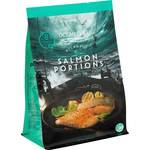I'm sure this will create a debate about fresh vs frozen… Farmed vs wild caught… All I know is with inflation, fresh salmon is now a minimum of $42 at Woolworths, so this deal is less than half that price.
To my knowledge this Ocean Chef salmon hasn't been this price for over 14 months
Two options:
Salmon Portions Skin On
Salmon Portions Mediterranean Style



